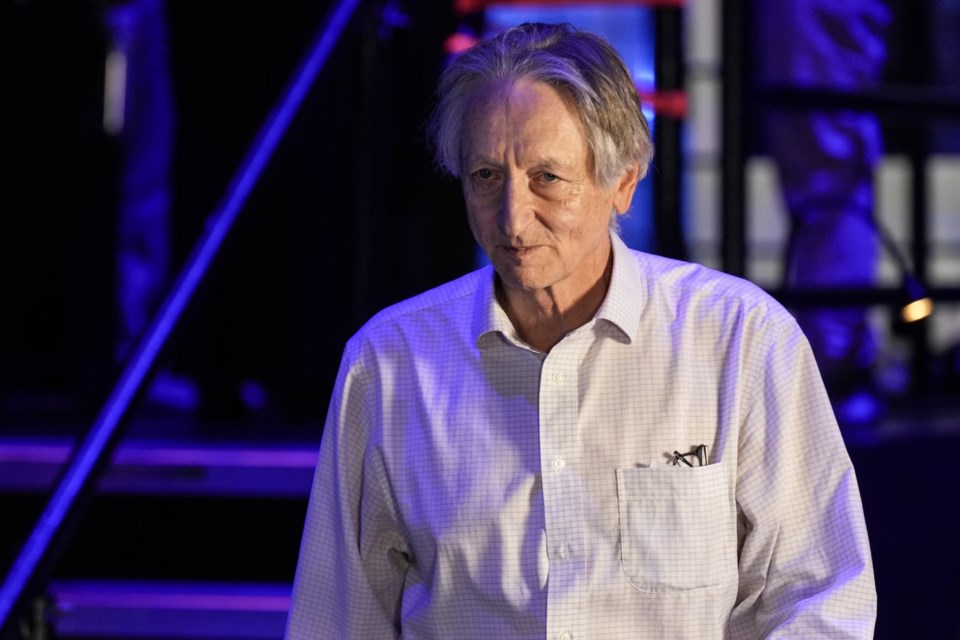TORONTO — Artificial intelligence pioneer Geoffrey Hinton has thrown some support behind creative industries, which have been battling tech firms to be compensated for their work.
The British Canadian computer scientist expressed worry Wednesday about how tech companies are training their models on artists' works and then allowing users to pump out new material based on that original content.
“Their stuff is being used by AI to generate these things that can be created and I'm not sure they're getting rewarded for it,” Hinton said on stage at the DiscoveryX tech conference in Toronto.
“I think the big tech companies should pay more for getting that training data.”
Hinton’s remarks touch on a topic that has riled up creative industries since OpenAI released its ChatGPT chatbot in November 2022, opening the floodgates for people to repurpose and reimagine just about any content they can get their hands on.
Ever since, everyone from musicians to book publishers and media companies have found instances of AI companies training their models on content they found online or in free databases. These companies have then allowed people to use their software to spit out new works based on that original material without any money making its way to back to the creators.
Hinton appears to be uneasy with the practice. Not only is he "worried about (AI's) influence on the creative arts" because of the lack of compensation, but he also feels policymakers aren't doing enough.
"In Britain in particular, the government seems uninterested in protecting the creative industries," he said.
The lack of policy help has left creative companies and artists taking matters into their own hands and lobbing lawsuits at AI giants.
A coalition of media companies, including The Canadian Press, Torstar, The Globe and Mail, Postmedia and CBC/Radio-Canada, took on OpenAI in November, claiming their copyright had been infringed by the San Francisco-based firm.
Their lawsuit asks for compensation valued at $20,000 per work or an amount “the court considers just.” OpenAI has fired back, saying its models are trained on publicly available data and are "grounded in fair use and related international copyright principles that are fair for creators and support innovation."
The legal action preceded a similar move from the owner of the Toronto Star and U.S. publishers. They alleged Toronto-based AI darling Cohere infringed on their copyright by scraping copies of their articles from the internet without the publishers' permission or compensation.
They want up to $150,000 for every article they allege was infringed by Cohere, which is run by some of Hinton’s proteges and has called the lawsuit "misguided and frivolous."
The lawsuits didn't figure into Hinton's Wednesday talk, which was hosted by Jordan Jacobs, managing partner of Radical Ventures, which invests in AI startups.
Instead, the two men spent much of their discussion dwelling on the speed at which AI has progressed in recent years.
"I am not surprised it is everywhere, but I am surprised how fast it has been in the past few years and how slow it was before that," Hinton said.
His early work on the technology dates back several decades and some of the most famous advances he made came in the 1980s. Those advances were only awarded with a Nobel Prize last year.
"My goal in life was to understand how the brain works," said Hinton, who studied philosophy before psychology. "I failed, but along the way we produced some technology and it was very successful."
Hinton has used the recent spotlight put on his accomplishments to warn of a myriad of problems he thinks may arise from AI including cyberattacks, "nasty" viruses, joblessness, election corruption, lethal autonomous weapons and even the demise of humanity.
On Wednesday, he said it's quite likely the world will see superintelligence — AI that surpasses human intelligence — in the next 18 years.
In the more near-term, he sees "ordinary, mundane office work" being taken over by AI as well as tasks carried out by mathematicians.
"I'm a bit hesitant to make predictions about the exact timings of things in the future, but I strongly suspect the role of mathematicians will be to prompt the AI mathematicians."
This report by The Canadian Press was first published April 16, 2025.
Tara Deschamps, The Canadian Press

